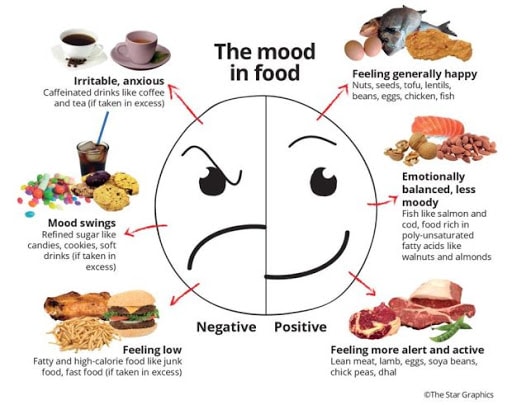Food is not just fuel for our bodies; it’s a complex and often deeply emotional aspect of our lives. Our relationship with food goes beyond mere sustenance; it intertwines with our emotions, memories, and overall well-being. In this article, we will explore the intricate connection between food and mood, shedding light on how our emotional relationship with eating impacts our lives.
The Emotional Eating Spectrum
Emotions play a significant role in our eating habits. At one end of the spectrum, we have emotional eating, which involves using food to cope with emotions, such as stress, sadness, or boredom. On the other end, we have mindful eating, a practice that encourages being fully present and aware of the eating experience.
- Emotional Eating: This form of eating is often driven by the need for comfort or relief from negative emotions. People may turn to their favorite comfort foods when feeling stressed, lonely, or anxious. The temporary comfort provided by these foods can become a coping mechanism.
- Mindful Eating: Mindful eating is about paying close attention to the sensory aspects of eating—the taste, texture, and aroma of food. It involves savoring each bite and being in the moment without distractions. Mindful eating can help individuals develop a healthier and more balanced relationship with food.
The Mood-Food Connection
Our emotional relationship with food is a two-way street: our mood can influence our food choices, and the food we consume can impact our mood:
- Food and Mood Enhancement: Certain foods can trigger the release of neurotransmitters like serotonin and dopamine, which are associated with feelings of happiness and pleasure. This is why comfort foods like chocolate, ice cream, and pizza are often craved during times of stress or sadness.
- Stress and Emotional Eating: Stress can lead to emotional eating, as many individuals seek solace in food when faced with challenging situations. Unfortunately, this can often result in unhealthy food choices and a cycle of negative emotions.
- Nutrition and Mental Well-being: A well-balanced diet rich in nutrients is essential for maintaining optimal mental health. Nutrient deficiencies can contribute to mood disorders like depression and anxiety.
Tips for Mindful Eating
Practicing mindful eating can help foster a healthier and more positive relationship with food and emotions:
- Eat with Awareness: Slow down and pay attention to your food. Savor each bite and appreciate the flavors and textures.
- Eliminate Distractions: Turn off the TV, put away your phone, and create a calm and focused eating environment.
- Listen to Hunger Cues: Eat when you’re hungry and stop when you’re satisfied. Pay attention to your body’s signals rather than eating out of habit or emotional triggers.
- Choose Nutrient-Dense Foods: Opt for foods that nourish your body and mind. Include a variety of fruits, vegetables, whole grains, lean proteins, and healthy fats in your diet.
- Practice Mindfulness: Incorporate mindfulness techniques into your eating routine. Take a few deep breaths before eating, and express gratitude for your food.
- Engage All Senses: Engage your senses by appreciating the colors, aromas, and textures of your meal.
Navigating Emotional Eating
Understanding the emotional aspects of your relationship with food is the first step in navigating emotional eating:
- Identify Triggers: Recognize the emotional triggers that lead to unhealthy eating patterns. Stress, boredom, and loneliness are common triggers.
- Seek Healthy Alternatives: Find alternative ways to cope with emotions that don’t involve food. Engage in activities like exercise, meditation, journaling, or talking to a friend.
- Practice Self-Compassion: Be kind to yourself and avoid self-criticism. Remember that occasional emotional eating is normal, and it’s okay to indulge in moderation.
- Build Support Systems: Connect with friends or professionals who can provide emotional support and guidance in managing emotional eating.
- Consult a Professional: If emotional eating becomes a persistent issue, consider seeking the help of a therapist or counselor who specializes in eating disorders or emotional health.
Conclusion
Our emotional relationship with food is a complex and deeply ingrained aspect of our lives. Understanding how food and mood are interconnected is essential for fostering a healthy and balanced relationship with what we eat. By practicing mindful eating and addressing emotional eating triggers, we can make more informed and positive food choices that contribute to our overall well-being. Remember, food is not just nourishment for the body; it can also nurture the soul when approached with mindfulness and self-compas




